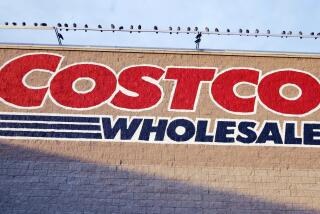Municipal Court to Take Credit Where It Is Due
- Share via
TORRANCE — “Master the possibilities.” So urges the long-running television commercial promoting the use of a particular credit card.
South Bay Municipal Court officials say that they hope to live up to the ad’s slogan next month when the court begins accepting MasterCard and Visa for payment of traffic and other misdemeanor fines.
Attorneys also will be able to charge the $34 cost of filing a civil lawsuit.
The idea, said court administrator Chris Crawford, is to streamline the court’s operations and perhaps lessen some of the inconvenience faced by people who now must pay by cash or check.
“What we’re doing is bringing the court into the 20th Century,” Crawford said. “After all, we are rapidly becoming a plastic money society.”
The South Bay court is one of a number nationally that have decided to allow people to use credit cards.
Herb B. Barrett, a manager for Tennessee-based Comdata Network, which contracted with the South Bay court to set up the credit-card payment system, said that courts in 16 states now allow the use of credit cards.
Glendale Municipal Court began accepting credit cards on Aug. 1, and Los Angeles Municipal Court permits credit card use at its Van Nuys and Westchester branches as part of a pilot program.
Since the Van Nuys branch court began taking the cards in late July, the response has been less than overwhelming, according to Peggy Shuttleworth, chief of the Los Angeles court’s Valley Division.
However, she said that she expects the use of the cards to pick up once word spreads.
“I don’t think people come into the courthouse expecting to be able to use a credit card,” Shuttleworth said.
In contrast, Sheila Gonzalez, administrator at Glendale Municipal Court, said the response has been “great. The public had been asking us on numerous occasions if they could use their bank card, and we just weren’t able to give them that option.”
Crawford is optimistic that the credit card option will be a hit in the South Bay.
Besides eliminating for fine-payers the hassle of carrying cash, he predicts, use of the cards will cut down on the number of bad checks the court gets stuck with (the court will check credit limits on cards before it accepts them).
Moreover, he said, the cards might cut down on the number of extensions judges now give defendants to come up with bail for certain offenses.
For instance, Crawford said that someone arrested for drunk driving might face a fine of about $600 and have to ask the judge for some time to come up with the cash. Not so if he or she has a credit card.
“This could make it easier for someone to finance the whole thing,” Crawford said.
There is a catch, however. People using their cards will have to pay a fee of about $5 for a fine of $50 or less. Any fine over that amount will be subject to an additional a $1 fee for every $50 increment.
Despite the surcharge, Crawford sees the good of using the cards surpassing the bad.
“I just think about myself standing in a line at the courthouse to pay for some offense like blowing a red light. I think some of the pain could be eased if I could put the fine on my Visa or MasterCard.”
But they will not take American Express.
More to Read
Sign up for Essential California
The most important California stories and recommendations in your inbox every morning.
You may occasionally receive promotional content from the Los Angeles Times.










